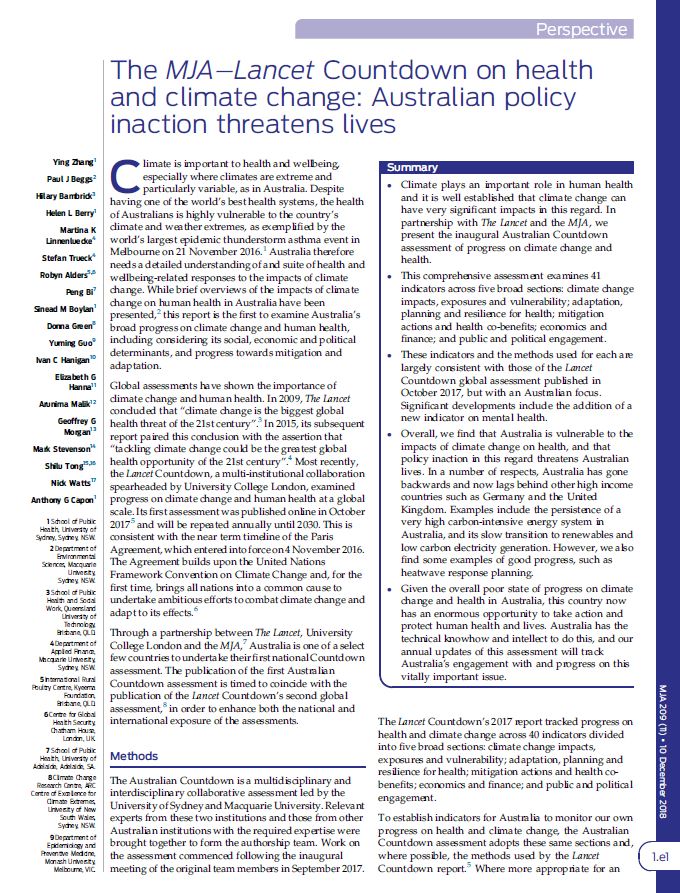The MJA-Lancet Countdown on health and climate change
In partnership with The Lancet and the MJA, we present the inaugural Australian Countdown assessment of progress on climate change and health.
Ying Zhang,1 Paul J Beggs,2 Hilary Bambrick,3 Helen L Berry,1 Martina K Linnenluecke,4 Stefan Trueck,4 Robyn Alders,5,6 Peng Bi,7 Sinead M Boylan,1 Donna Green,8 Yuming Guo,9 Ivan C Hanigan,10 Elizabeth G Hanna,11 Arunima Malik,12 Geoffrey G Morgan,13 Mark Stevenson,14 Shilu Tong,15,16 Nick Watts,17 Anthony G Capon.1
MJA, Published online first 29 November 2018.
Summary
- Climate plays an important role in human health and it is well established that climate change can have very significant impacts in this regard.
- This comprehensive assessment examines 41 indicators across five broad sections: climate change impacts, exposures and vulnerability; adaptation, planning and resilience for health; mitigation actions and health co-benefits; economics and finance; and public and political engagement.
- These indicators and the methods used for each are largely consistent with those of the Lancet Countdown global assessment published in October 2017, but with an Australian focus. Significant developments include the addition of a new indicator on mental health.
- Overall, we find that Australia is vulnerable to the impacts of climate change on health, and that policy inaction in this regard threatens Australian lives. In a number of respects, Australia has gone backwards and now lags behind other high income countries such as Germany and the United Kingdom. Examples include the persistence of a very high carbon-intensive energy system in Australia, and its slow transition to renewables and low carbon electricity generation. However, we also find some examples of good progress, such as heatwave response planning.
- Given the overall poor state of progress on climate change and health in Australia, this country now has an enormous opportunity to take action and protect human health and lives. Australia has the technical knowhow and intellect to do this, and our annual updates of this assessment will track Australia’s engagement with and progress on this vitally important issue.
Author Affiliations
1School of Public Health, University of Sydney, Sydney, NSW.
2Department of Environmental Sciences, Macquarie University, Sydney, NSW.
3School of Public Health and Social Work, Queensland University of Technology, Brisbane, QLD.
4Department of Applied Finance, Macquarie University, Sydney, NSW.
5International Rural Poultry Centre, Kyeema Foundation, Brisbane, QLD.
6Centre for Global Health Security, Chatham House, London, UK.
7School of Public Health, University of Adelaide, Adelaide, SA.
8Climate Change Research Centre, ARC Centre of Excellence for Climate Extremes, University of New South Wales, Sydney, NSW.
9Department of Epidemiology and Preventive Medicine, Monash University, Melbourne, VIC.
10University Centre for Rural Health, University of Sydney, Sydney, NSW.
11Climate Change Institute, Australian National University, Canberra, ACT.
12School of Physics, University of Sydney, Sydney, NSW.
13University Centre for Rural Health, University of Sydney, Lismore, NSW.
14Melbourne School of Population and Global Health, University of Melbourne, Melbourne, VIC.
15Department of Clinical Epidemiology and Biostatistics, Shanghai Jiao Tong University, Shanghai, China.
16Institute of Environment and Population Health, Anhui Medical University, Hefei, China.
17Institute of Global Health, University College London, London, UK.
Citation
Zhang, Y, et al. (2018). The MJA-Lancet Countdown on health and climate change: Australian policy inaction threatens lives. MJA 209(11). doi: 10.5694/mja18.00789.
